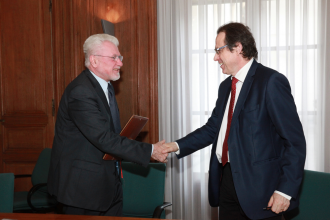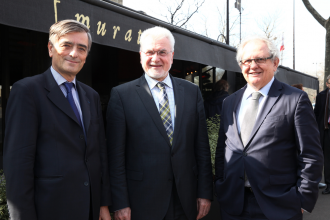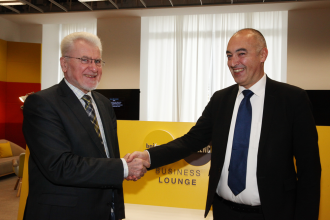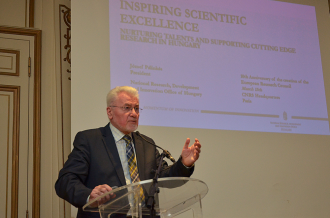The conference organised by the French National Centre for Scientific Research (CNRS), the French equivalent of the the research centre network of the Hungarian Academy of Sciences, in the framework of the event marking the 10th anniversary of the European Research Council (ERC) showed that CEE countries are still seriously lagging behind Western Europe in the area of research and development. Hungary can only keep its leading role in Central Europe if it spends significantly more on R&D, following the example set by Poland – the President of the NRDI Office stressed.
The Paris event aimed to promote the visiting fellowship related to the ERC programme (and backed by the NRDI Office in Hungary) and thus encourage young researchers, including Hungarian ones, to visit CNRS research groups which had successfully applied for ERC funding. The inspiration gained during such visits would improve their chances for successful application in the prestigious programme.
NRDI Office data shows that with 13 funded projects and a total funding amount of nearly EUR 19 million; Hungary is one of the best-performing applicants in the region.
According to József Pálinkás, we have reached a turning point where we have to decide if we want to “develop or lag behind”. In this respect the 2018–2019 period will be critical as it will become evident whether Hungary has managed to take the necessary steps to become an RDI centre in the region. Also, the substantial EU funds spent on this area in 2016–2017 can only be utilised if we increase domestic expenditures – he pointed out.
The cooperation agreement between the French scientific centre and the ELI laser facility in Szeged supervised by the NRDI Office was signed on 16 March in Paris and József Pálinkás said “this is a very significant commitment” from France and needs to be further expanded.
According to József Pálinkás, the efficient utilisation and success of the ELI infrastructure built in Central Eastern Europe (in addition to Szeged, in the Czech Republic and Romania) plays a key role in strengthening trust within the European Union. At the same time, we can only use 20-25% of the facility’s capacity in Hungary, so the President of the NRDI Office expects that the Western partners will also contribute the financing of the operation of the laser centre which was built by Hungary with a budget of around HUF 70 billion (EUR 233 million). To this end, the NRDI Office would like to see France participating in the ELI consortium by paying the membership fee in the future.
József Pálinkás’ meeting with the heads of OPECST, the scientific and technological advisory organisation attached to the French National Assembly and Senate, and his visit to ANR, the French National Research Funding Agency also focused on how to make the laser centre a successful project.
“I made it clear how important it is for Hungary to fully integrate into the European infrastructure and research life,” the President of the NRDI Office said.
According to József Pálinkás, BPI France, which was founded as a public institution operating as an investment bank in 2013 to support corporate and institutional innovation and research projects and to provide advice to startup businesses and innovative SMEs, could form an excellent partnership with the venture capital company Hiventures, recently established by the Hungarian Development Bank.
József Pálinkás also met the representatives of the French network of Hungarian researchers (Science Innovation France Hongrie, SIFraH). He thinks that this community could greatly contribute to the development of Hungarian-French scientific relations; it could be involved in the evaluation of national research programmes and could help in making Hungarian scientific achievements more visible in France.
Source: MTI
Download presentation: József Pálinkás: Inspiring scientific excellence PDF (1 301 KB)
photo: Marc Beaudenon










